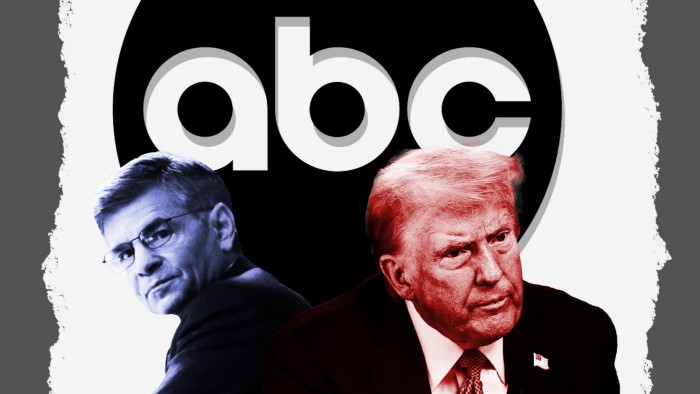ABC’s payout to Donald Trump sends a chill across US media

Disney’s $15mn defamation payout to Donald Trump has set a dangerous precedent for media freedom, said legal experts and news executives, as the incoming president threatens to “straighten out” the “corrupt” press.
Disney-owned ABC News last week agreed to pay Trump the huge sum to settle a defamation suit he brought in March after star anchor George Stephanopoulos said on-air that the former president had been found “liable for rape”.
A New York jury found Trump liable in a civil case for sexual abuse, but not rape.
While Stephanopoulos in May said he would not be “cowed out of doing my job”, on Saturday he and ABC expressed their “regret” over his comment about Trump.
The network’s decision left some lawyers, journalists and media executives puzzled — and prompted fears that Trump, who has threatened libel lawsuits against news media for decades, could use presidential power to muzzle the press.
“I genuinely don’t know what ABC was thinking when they agreed to do this . . . Unless there is something we don’t know, it looks like it was a weak suit,” said Genevieve Lakier, a law professor at the University of Chicago. “For ABC to give in and settle so quickly, surely it will embolden similar suits. I am disturbed.”
ABC’s decision to settle was “dangerous” and would have a “chilling effect”, said Samantha Barbas, a University of Iowa law professor. “It will embolden Trump and his allies to keep bringing these libel suits. If they feel they can silence the press or control the press, intimidate it in any way, that’s going to be a real incentive for them to come forward with more claims.”
Trump on Monday said he would bring additional defamation lawsuits against media groups. “I think you have to do it because they’re very dishonest. We need a great media. We need a fair media,” he said. “We have to straighten out the press. Our press is very corrupt, almost as corrupt as our elections.”
The standard for proving defamation under US law is high. As a public figure, Trump would have to prove that Stephanopoulos’s comment was false and made with “reckless disregard” for the truth, according to legal scholars.
“The constitutional standard in these sorts of defamation cases is extraordinarily defendant-friendly — literally the strongest protection in the world — so ABC came into this suit with a boulder on the scale in its favour,” said RonNell Andersen Jones, a University of Utah law professor.
Lawyers cautioned that there could be information that might have influenced ABC’s decision to settle that is not publicly known, making it impossible to determine the network’s motive.
But the agreement fuelled speculation that ABC settled with Trump to avoid further wrath from the incoming president. He has doubled down on his attacks on the media, threatening to revoke broadcast licences for news channels including ABC.
A Disney spokesperson referred questions about the settlement to ABC. ABC did not immediately respond to requests for comment.
Chief executives across corporate America are preparing for Trump 2.0, with big tech companies including Amazon and Meta recently donating millions of dollars to his inauguration fund.
Disney has a particularly thorny association to grapple with. Senior Disney executive Dana Walden, considered a potential successor to chief executive Bob Iger, is a longtime friend of Kamala Harris — a point Trump hammered this election year as he slammed ABC.
Iger, who has regularly donated to Democrats, drew attention for not making any political contributions this year, adding to a sense that media bosses are trying to avoid antagonising Trump.
As he criticised media groups on Monday, Trump suggested his lawsuits could even target The Des Moines Register, an Iowa newspaper, for publishing a poll showing he would lose a state he ended up winning comfortably.
Trump also noted plans for separate suits against CBS’s 60 Minutes programme, journalist Bob Woodward, The New York Times and The Washington Post.
In the 1980s, then a real estate developer, Trump sued the Chicago Tribune when its architecture writer described his proposed Manhattan skyscraper as an “ugly monstrosity”. That suit was dismissed. Trump has also lost defamation lawsuits against media groups including CNN and the NYT.
But dealing with these lawsuits is expensive and time-consuming for news organisations, which can also be legally obliged to make public their internal communications.
In the wake of the ABC settlement, some news organisations are questioning whether they have the means to defend themselves. One media attorney said he had received “a flurry of emails this morning asking if we have enough libel insurance”.
While Trump might have struggled in the ABC case, legal experts cautioned that any decision would be made by a jury — and Americans have grown more antagonistic towards the news media in recent years. In 2016, a Florida jury ordered Gawker to pay wrestler Hulk Hogan more than $115mn in damages, which bankrupted the media site.
Trump’s case against ABC was also filed in Florida. One experienced media lawyer told the Financial Times that the network might have faced difficulty winning over a Florida jury, partly because of Stephanopoulos’s aggressive questioning of Nancy Mace, a member of the US Congress, during the broadcast.
“You are trying to shame me as a rape victim,” Mace said to Stephanopoulos in the interview. The combination of Disney executive Walden’s friendship with Harris and the tone of the interview meant they “had a real risk of losing the jury”, the lawyer said.
“Juries today are increasingly unhappy with the press, and would like to punish the press”, said Barbas at the University of Iowa. “We may be entering an era of libel warfare.”
#ABCs #payout #Donald #Trump #sends #chill #media




